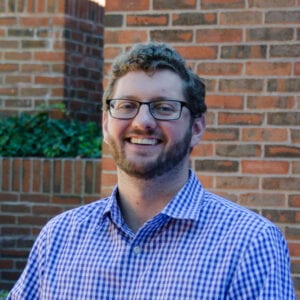Published: Monday, July 13, 2020, 12:00 p.m. U.S. Eastern Time
Media Contact: Kara Flynn, 301.634.8424 press@ashg.org

ROCKVILLE, MD – The American Society of Human Genetics (ASHG) has named Benjamin Neale, PhD as the recipient of the 2020 Early-Career Award. Dr. Neale is the Director of the Genomics of Public Health Initiative at Massachusetts General Hospital (MGH). He is also an Associate Professor at Harvard Medical School, an Institute Member in the Medical and Population Genetics program of the Broad Institute, and the Director of Genetics for the Stanley Center for Psychiatric Research at the Broad Institute.
This award, which includes a plaque and a $10,000 prize, recognizes the contributions of genetics and genomics scientists in the first ten years of their careers as independent investigators.
“Early in his career, Dr. Benjamin Neale focused heavily on the development and application of statistical methodology for genetic analysis,” said ASHG President Anthony Wynshaw-Boris. “He has a remarkably strong track record of conducting analyses for genetic data with a heavy focus on psychiatric illness, particularly ADHD and Autism. His studies have the potential to understand novel pathways responsible for psychiatric disease and influence the development of new diagnoses and treatments.”
“Since the early years of his training, Ben has made numerous contributions to statistical
genetics methodologies (and is widely considered a leading expert across this field), but much more than this has been a driving force in both the development and engineering of computational methods fundamental to our field in the era of large-scale genomic data,” said Mark J. Daly, PhD, Chief of the Analytic and Translational Genetics Unit at Massachusetts General Hospital, in his nomination letter.
Dr. Neale is strongly committed to gaining insights into the genetics of common, complex human diseases. Dr. Neale and Dr. Daly, both of whom are associated with the Broad Institute and MGH, have led some of the largest-scale genetic discovery efforts in mental illness, including schizophrenia, bipolar disorder, autism spectrum disorders and ADHD.
Dr. Neale studied at the University of Chicago and Virginia Commonwealth University, where he earned his Bachelor’s degree in genetics. He went on to earn his PhD in human genetics from King’s College in London, UK. Dr. Neale completed his postdoctoral training in Dr. Daly’s laboratory at Massachusetts General Hospital. Dr. Neale’s work has focused heavily on statistical methodology. He has analyzed genetic data from large-scale studies of patients with ADHD, autism, age-related macular degeneration, type 2 diabetes, and various metabolic disorders. Additionally, Dr. Neale’s lab is currently leading the development of Hail, a cloud-native software platform for scalable genetic analysis. In addition to his roles at both the Broad Institute and MGH, Dr. Neale co-chairs the Maps workgroup for the International Common Disease Alliance, as well as co-chairs the ADHD Psychiatric Genomics Consortium Workgroup. Dr. Neale has also led the design of multiple genotyping arrays, including the Psych Chip and the Exome Chip, a genotyping array that captures rare coding variation in a cost-effective manner.
Although ASHG made the decision to host the Society’s annual meeting virtually, the exact timing of the Early Career Award Presentation is not yet known. An update will be provided as soon as information is available.
About the American Society of Human Genetics (ASHG)
Founded in 1948, the American Society of Human Genetics is the primary professional membership organization for human genetics specialists worldwide. Its nearly 8,000 members include researchers, academicians, clinicians, laboratory practice professionals, genetic counselors, nurses, and others with an interest in human genetics. The Society serves scientists, health professionals, and the public by providing forums to: (1) share research results through the ASHG Annual Meeting and in The American Journal of Human Genetics; (2) advance genetic research by advocating for research support; (3) educate current and future genetics professionals, health care providers, advocates, policymakers, educators, students, and the public about all aspects of human genetics; and (4) promote genetic services and support responsible social and scientific policies. For more information, visit: http://www.ashg.org.
6120 Executive Blvd, Suite 500 | Rockville, MD 20852 | 301.634.7300 | society@ashg.org | www.ashg.org
Connect with ASHG on Twitter (@GeneticsSociety) | Facebook | LinkedIn
